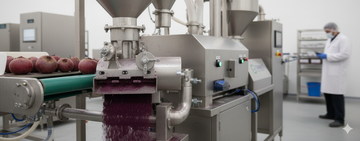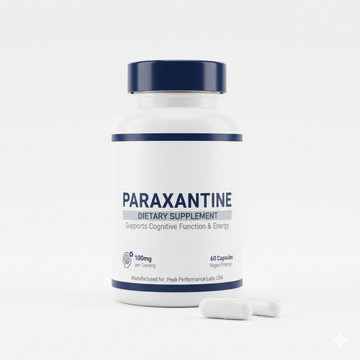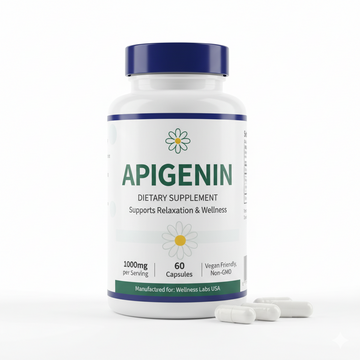Critical guidance for brands entering the beetroot and nitrate supplement space

Why Beetroot Supplements Are Exploding (And Why You Need Expert Manufacturing)
Look, I get it. You see the beetroot supplement boom happening - athletes swearing by it for endurance, the cardiovascular health market going crazy for nitric oxide support, the research backing it up. You're thinking this is your moment to jump in. And you're right about the amazing opportunity. The science is solid, consumer demand is real, and the market is growing fast.
But I need to be straight with you about something most manufacturers won't tell you until after they've taken your money: beetroot supplement manufacturing is a legal minefield that's destroyed more than one brand I've watched from the sidelines.
Over the years, certain companies have built aggressive intellectual property portfolios around beetroot extraction methods, specific nitrate concentrations, patented combinations with amino acids, timing protocols, and even certain health claims. They don't just own these patents - they actively hunt for brands to enforce them against. I'm talking cease-and-desist letters, litigation threats, and financial settlements that can sink a startup before it ever gets off the ground. It's brutal.
I've had to have some tough conversations with potential clients over the years. Sometimes the best advice I can give is "don't make that product" - even when it would be profitable for us. Because protecting your vision and your investment matters more than any single project. That's just how we work.
The Patent Troll Problem in Beetroot Manufacturing
Understanding the IP Landscape
I've been in this industry long enough to watch certain companies weaponize patents in ways that honestly make my blood boil. They've locked down specific extraction processes, standardized nitrate levels, and particular formulation approaches. Then they sit back and wait for smaller brands to launch products, and boom - the legal letters start flying.
This isn't me being paranoid or theoretical. I've personally watched multiple brands get absolutely hammered with legal action after launching beetroot products that unknowingly stepped on patent landmines. One brand I hear of had to trash $50,000 worth of finished inventory and completely reformulate. Another faced a settlement demand that was more than their entire first year's revenue. A couple others just gave up and exited the category entirely.
The worst part? Most of these brands had no idea they were even at risk. Their manufacturer just mixed up the formula without mentioning the patent issues. By the time they found out, they'd already invested in packaging, marketing, and building distribution. That's why I'm writing this - someone needs to tell you the truth before you make expensive mistakes.
What's Actually Patented?
While we can't provide legal advice (always consult with an IP attorney), here are some areas where patents exist in the beetroot space:
- Specific extraction methods for concentrating nitrates from beetroot
- Standardized nitrate concentrations at certain levels (measured in mg per serving)
- Particular beetroot-to-nitrate conversion processes
- Combination formulas that include beetroot with specific other ingredients
- Processing techniques that preserve or enhance nitrate bioavailability
- Timing and delivery mechanisms for nitrate absorption
Why You Need Manufacturing Partners with Legal Experience
A quality beetroot contract manufacturer should have:
- Detailed knowledge of existing patents in the beetroot/nitrate space
- Established formulation approaches that avoid patent infringement
- Legal review processes for new beetroot formulations
- Relationships with IP attorneys familiar with supplement patents
- Documentation proving their processes don't infringe existing patents
This isn't just about creating a product that works - it's about creating one you can actually sell without getting sued.
Here's my philosophy: I'd rather turn away a project that puts a client at risk than make a quick buck and watch their brand get destroyed six months later. We've literally said "no" to people who insisted on risky formulations, even though it cost us revenue. But that's the difference between being a manufacturing partner and being an order-taker. I sleep better at night knowing our clients aren't going to get blindsided by legal problems we could have prevented.

The Science Behind Beetroot Supplements
Why Beetroot Works: The Nitric Oxide Connection
Beetroot is naturally high in dietary nitrates (NO₃⁻). When you consume beetroot, your body converts these nitrates through a two-step process:
- Oral bacteria convert nitrates to nitrites (NO₂⁻)
- These nitrites are then converted to nitric oxide (NO) in the blood and tissues
Nitric oxide is crucial for:
- Vasodilation: Widening blood vessels for better blood flow
- Oxygen delivery: Enhanced nutrient and oxygen transport to muscles
- Blood pressure support: Helping maintain healthy cardiovascular function
- Athletic performance: Improved endurance and reduced oxygen cost during exercise
- Exercise recovery: Better circulation supports faster recovery
What Makes Beetroot Unique
Unlike synthetic nitrates or some other nitric oxide boosters, beetroot provides:
- Natural nitrate source that consumers trust and recognize
- Additional phytonutrients including betalains (the compounds that make beets red)
- Antioxidant benefits beyond just nitric oxide production
- Clean label appeal - it's just vegetables, which resonates with health-conscious consumers
The Research Backing Beetroot
Studies have shown beetroot supplementation may:
- Improve time to exhaustion in endurance activities by 15-25%
- Reduce oxygen cost during exercise by 3-5%
- Support healthy blood pressure levels already within normal range
- Enhance cognitive function through improved cerebral blood flow
This solid research base makes beetroot supplements easy to market - but remember, how you phrase these benefits matters for both regulatory compliance AND patent considerations.
Sourcing Beetroot: Quality and Legal Considerations
Types of Beetroot Ingredients
Beetroot Powder (Non-Standardized)
Basic dehydrated and powdered beetroot. No standardization for nitrate content.
Pros:
- Generally lower patent risk (it's just powdered beets)
- Cost-effective
- Easy to market as "whole food"
- Natural color for products
Cons:
- Inconsistent nitrate levels batch-to-batch
- Lower nitrate concentration means larger serving sizes
- Less predictable results
- Earthy taste can be challenging in some formats
Best for: Greens powders, whole-food blends, budget-friendly products.
Beetroot Extract (Standardized)
Concentrated beetroot with standardized nitrate content.
Pros:
- Consistent nitrate levels
- Smaller serving sizes
- More predictable efficacy
- Better for capsules and tablets
Cons:
- POTENTIALLY HIGH PATENT RISK depending on extraction method and standardization level
- More expensive than basic powder
- Requires careful supplier selection
- May need legal review before use
Best for: Pre-workout supplements, clinical-dose products, premium offerings.
⚠️ CRITICAL WARNING: If you're using standardized beetroot extract, you MUST work with a manufacturer who can verify the extraction process doesn't infringe existing patents. This is where most brands get into trouble.
Beetroot Juice Powder
Dehydrated beetroot juice, typically with higher natural nitrate content than standard powder.
Pros:
- Higher natural nitrate content than basic powder
- Better solubility for drinks and powders
- Pleasant color and reasonable taste
- Moderate patent risk
Cons:
- Still variable in nitrate content
- More expensive than basic powder
- Shorter shelf life than extracts
Best for: Sports drink mixes, pre-workout powders, functional beverages.
Quality Testing Requirements
When sourcing beetroot ingredients for beetroot supplement manufacturing, require:
- Nitrate content testing (usually measured as NO₃⁻ per serving)
- Heavy metals screening (beets can accumulate metals from soil)
- Pesticide residue testing
- Microbial contamination testing
- Betalain content (optional, but good for quality verification)
- Solubility testing if using in drink mixes
- Supplier documentation proving their process doesn't infringe patents
Geographic Sourcing
European sources: Generally high quality, often organic, stricter regulations. Netherlands and UK are major producers.
US sources: Shorter supply chain, easier traceability, premium positioning. Growing domestic beetroot supplement market.
Other sources: Available but require more rigorous quality verification. Always test for heavy metals.

Formulation Strategies That Avoid Patent Issues
Safe Approaches to Beetroot Formulation
Working with an experienced beetroot supplement manufacturer, here are some generally safer formulation approaches:
Whole Food Approach
Using non-standardized beetroot powder in whole-food blends or greens formulas. Lower patent risk because you're not claiming specific nitrate levels or using proprietary extraction.
Example positioning: "Contains 2000mg organic beetroot powder" rather than claiming specific nitrate content.
Hybrid Formulations
Combining beetroot with other nitric oxide supporting ingredients like L-Citrulline, L-Arginine, or watermelon extract. This creates a unique formula that's harder to claim infringes on single-ingredient patents.
Novel Combinations
Pairing beetroot with ingredients for specific use cases that aren't covered by existing patents. Think outside the typical "pre-workout" box.
What to Avoid
Without legal review, be extremely cautious about:
- Claiming specific nitrate levels (especially certain standardized amounts)
- Using specific extraction methods described in existing patents
- Making claims that align too closely with patented uses
- Timing protocols that match patented recommendations
- Specific combinations that are covered by combination patents
Dosing Considerations
Effective beetroot doses typically range from:
- Whole beetroot powder: 3,000-6,000mg per serving
- Beetroot juice powder: 1,000-3,000mg per serving
- Standardized extract: Varies based on standardization - REQUIRES PATENT REVIEW
Research suggests optimal timing is 2-3 hours before exercise for peak nitric oxide levels, but even mentioning specific timing in your marketing could trigger patent concerns in some cases.
Synergistic Ingredients
Beetroot works well combined with:
- L-Citrulline: Different nitric oxide pathway, complementary effects
- Vitamin C: Helps preserve nitric oxide
- Antioxidants: Support the nitric oxide pathway
- B-Vitamins: Support energy metabolism during exercise
- Electrolytes: For hydration in sports formulas

Choosing a Beetroot Supplement Manufacturer
Why Manufacturing Experience Matters More for Beetroot
Any manufacturer can mix beetroot powder into capsules. But creating beetroot products that won't land you in legal hot water? That requires specific experience.
Essential Qualifications
Your beetroot contract manufacturer should have:
- Patent awareness: Detailed knowledge of IP issues in the beetroot space
- Legal resources: Access to IP attorneys for formulation review
- Documentation: Written policies on patent risk assessment
- Experience: History of creating beetroot products that haven't been challenged
- Supplier relationships: Vetted beetroot suppliers with proper documentation
- Testing capabilities: Nitrate testing, heavy metals, full quality panel
- Formulation expertise: Creative approaches that achieve results without legal risk
- GMP certification: Non-negotiable for quality and compliance
Red Flags to Watch For
- Manufacturer doesn't ask about your target formulation or claims
- No mention of patent considerations when discussing beetroot
- Pushing specific standardized extracts without discussing legal review
- Can't provide documentation on supplier extraction methods
- Unfamiliar with major players and IP in the beetroot space
- No experience with beetroot products specifically
Why Choose Turnkey Health & Beauty
At Turnkey Health & Beauty, we've navigated the complex landscape of beetroot supplement manufacturing for multiple brands. Here's what sets us apart:
- Patent-Aware Formulation: We start every beetroot project with IP considerations, not as an afterthought
- Legal Review Process: We work with supplement-specialized IP attorneys to review formulations before production
- Vetted Suppliers: Our beetroot suppliers provide full documentation on extraction methods and patent status
- Creative Solutions: We've developed multiple approaches to beetroot formulation that deliver results without legal risk
- Complete Testing: Nitrate analysis, heavy metals, microbial - full quality verification
- Honest Guidance: We'll tell you when a formulation is too risky, even if it means losing a project
- Full-Service Support: From formulation through manufacturing and compliance
Why we do things differently: I've turned down beetroot projects that would have made us good money but would have exposed clients to serious legal risk. It's not always the popular decision internally, but it's the right one. Your success and protection aren't just buzzwords for us - they're literally how we make decisions every day. That's what partnerships are supposed to look like.
Delivery Formats for Beetroot Supplements
Format Considerations
Capsules
Best for: Concentrated extracts, daily supplementation, convenience
Considerations: Need smaller serving sizes, works best with extracts or juice powder
See our complete guide on capsules vs tablets for manufacturing details.
Powder Mixes
Best for: Pre-workout formulas, sports nutrition, flexibility in dosing
Considerations: Taste and solubility critical, color can be a feature or challenge
Tablets
Best for: Higher doses, cost-effective production, complex formulas
Considerations: Easier to mask taste, good for combination products
Gummies
Best for: Consumer appeal, taste-sensitive markets, kids' products
Considerations: Difficult to achieve clinical doses, stability concerns with nitrates
Ready-to-Drink Shots
Best for: Immediate pre-workout, convenience, premium positioning
Considerations: Preservation of nitrates, shelf stability, higher production costs
Regulatory and Compliance Issues
FDA Regulations for Beetroot Supplements
- Beetroot is a common food ingredient - generally recognized as safe
- Must comply with dietary supplement cGMP regulations (21 CFR Part 111)
- Structure/function claims require substantiation
- Cannot make disease claims
- Nitrate content should be disclosed if standardized
Acceptable vs. Risky Claims
Generally acceptable structure/function claims:
- "Supports healthy blood flow"
- "Promotes exercise endurance"
- "Supports nitric oxide production"
- "Helps maintain healthy circulation"
Avoid these disease claims:
- "Treats high blood pressure"
- "Cures erectile dysfunction"
- "Prevents heart disease"
Patent-risky claims (even if FDA compliant):
- Specific timing protocols for dosing
- Claims tied to specific nitrate levels
- Performance claims matching patented studies
- Language that mirrors patented marketing
International Considerations
- Europe: Nitrate supplements face stricter regulations, maximum nitrate intake limits apply
- Canada: NPN required, specific health claims need approval
- Australia: TGA regulations, listing required for specific claims
Market Positioning for Beetroot Products
Target Markets
Endurance Athletes
Runners, cyclists, triathletes looking for legal performance enhancement. Focus on oxygen efficiency and endurance.
Strength Athletes
Bodybuilders and powerlifters interested in muscle pumps and nutrient delivery. Emphasize vasodilation and circulation.
Active Aging
Older adults focused on cardiovascular health and maintaining vitality. Highlight blood flow and healthy aging.
Heart Health Conscious
Consumers proactively supporting cardiovascular function. Position around circulation and blood pressure support (carefully worded).
Natural Wellness
Health enthusiasts wanting whole-food based supplements. Emphasize the "it's just vegetables" angle.
Differentiation Strategies
- Organic certification: Appeals to natural wellness market
- Unique combinations: Create novel formulas not dominated by patent holders
- Format innovation: New delivery methods (gummies, shots, chews)
- Taste solutions: Better-tasting beetroot products win customers
- Transparency: Full disclosure of ingredients and amounts builds trust
- Third-party testing: Verified nitrate content, quality certifications
Marketing Approaches That Work
- Before/after performance data from real customers
- Educational content on nitric oxide and cardiovascular health
- Athlete endorsements and testimonials
- Comparison content vs. other nitric oxide boosters
- Recipe ideas for powder formats
Check out our supplement marketing guide for more strategies.
Cost and Pricing Considerations
Manufacturing Cost Factors
- Raw material costs: Basic beetroot powder ($10-25/kg) vs. standardized extracts ($50-150/kg)
- Testing requirements: Nitrate testing adds cost but builds credibility
- Legal review: IP attorney consultation adds upfront cost but prevents expensive problems
- Format complexity: Powders are simpler than capsules or gummies
- Certifications: Organic, Non-GMO, third-party testing increase costs
Market Pricing (2025)
- Basic beetroot powder: $15-25 (30 servings, whole food positioning)
- Pre-workout with beetroot: $30-45 (20-30 servings, combination formula)
- Premium beetroot extract: $35-50 (30 servings, standardized, clinical dose)
- Ready-to-drink shots: $3-5 per shot (convenience premium)
Margin Optimization
- Start with basic powder to test market, upgrade later
- Combination formulas justify higher prices
- Subscription models improve lifetime value
- Bundle with complementary products
- Focus on education to support premium positioning
Quality Control for Beetroot Supplements
Critical Testing Points
Raw Material Testing
- Nitrate content analysis: Verify actual NO₃⁻ levels
- Heavy metals: Lead, cadmium, arsenic, mercury (beets accumulate from soil)
- Pesticide residues: Multi-residue screening
- Microbial testing: Total plate count, pathogens
- Identity verification: Confirm it's actually beetroot (adulteration happens)
- Betalain content: Quality marker for genuine beetroot
Finished Product Testing
- Potency verification: Confirm label claims
- Stability testing: Nitrates can degrade - verify shelf life
- Dissolution: Ensure proper release from capsules/tablets
- Final microbial limits: Safety verification
Third-Party Certifications
- Informed Sport/Informed Choice: Critical for athlete market
- NSF Certified for Sport: Another athlete-focused certification
- USDA Organic: Premium positioning, higher prices justified
- Non-GMO Project: Consumer preference growing
- USP Verified: Quality assurance consumers recognize
Common Mistakes to Avoid
Legal Mistakes
- Launching without patent review of formulation
- Using standardized extracts without verifying extraction method
- Making claims that echo patented language
- Assuming "it's just beetroot" means no legal risk
- Not documenting your formulation development process
Formulation Mistakes
- Under-dosing beetroot for efficacy
- Ignoring taste in powder formulations
- Not testing nitrate stability over shelf life
- Combining incompatible ingredients
- Over-promising results that can't be delivered
Manufacturing Mistakes
- Choosing manufacturer based only on price
- Skipping heavy metals testing (serious issue with beets)
- Not verifying supplier extraction methods
- Inadequate stability testing
- Poor quality control on nitrate content
The Future of Beetroot Supplements
Emerging Trends
- Fermented beetroot: Enhanced bioavailability through fermentation
- Novel combinations: Beetroot with other superfoods or adaptogens
- Personalized dosing: Based on genetics or response testing
- New formats: Chewables, dissolving strips, functional foods
- Sustainability focus: Regeneratively grown beetroot, carbon-neutral production
- Clean label: Simpler formulas with fewer ingredients
Market Growth
The nitric oxide supplement market is growing at 8.5% annually, with beetroot-based products capturing significant share as consumers seek natural alternatives to synthetic pre-workouts and cardiovascular support.
Getting Started with Beetroot Manufacturing
Step-by-Step Process
- Consult with IP attorney: Before anything else, understand the patent landscape
- Define your target market: Athletes? Heart health? General wellness?
- Choose manufacturing partner: Select experienced beetroot manufacturer with patent awareness
- Develop formulation: Create effective formula that avoids patent issues
- Legal review of formula: Have formulation reviewed for patent risk
- Source ingredients: Vet suppliers for quality and patent-safe extraction
- Testing protocol: Establish nitrate testing and quality verification
- Production: Manufacture initial batch with full testing
- Marketing review: Ensure claims don't trigger patent issues
- Launch and monitor: Track results, gather feedback, optimize
Timeline Expectations
- Patent review: 2-4 weeks
- Formulation development: 3-6 weeks
- Supplier vetting: 2-4 weeks
- Manufacturing: 6-10 weeks
- Total time to market: 4-6 months (don't rush this)
Frequently Asked Questions
Is it really that risky to manufacture beetroot supplements?
Yes. The patent situation in beetroot/nitrate supplements is aggressive. We've personally seen multiple brands receive cease-and-desist letters. However, with proper guidance and formulation, you CAN create beetroot products safely. It just requires more due diligence than most supplement categories.
Can I just use basic beetroot powder and avoid patent issues?
Generally yes, but your claims and positioning still matter. If you're making specific performance claims or suggesting specific timing, you could still face challenges. Work with experienced partners to navigate this properly.
What's the minimum order quantity for beetroot supplements?
At Turnkey Health & Beauty, we work with brands from startup to scale. MOQs depend on format and complexity. Contact us to discuss your specific needs.
How much does patent review cost?
IP attorney consultation typically runs $2,000-5,000 for a formulation review. Expensive? Yes. But cheaper than defending against patent infringement litigation, which can easily exceed $100,000.
Can't I just change my formula if I get a cease-and-desist?
Possibly, but by then you've invested in inventory, packaging, marketing, and brand building. You might have to destroy finished goods. Better to get it right from the start.
Are there beetroot formulations that definitely don't infringe?
We can't provide legal advice, but there are approaches with significantly lower risk. Talk to manufacturers with beetroot experience who can guide you toward safer formulations.
How long does beetroot take to work?
Peak nitric oxide levels typically occur 2-3 hours after consumption, but even mentioning this timing could trigger patent concerns depending on how it's presented. Be careful with timing claims.
More questions? Visit our FAQ page.
Final Thoughts: Proceed with Caution and Expert Guidance
Listen, I want you to succeed in this space. Beetroot supplements are a genuinely amazing opportunity - the science backs it up, consumers are actively looking for these products, and the market keeps growing. I'm not trying to scare you away from beetroot. I'm trying to make sure you do it right.
But I'd be lying if I told you this was a simple category to enter. The patent landscape is aggressive, well-funded, and has destroyed more than one brand I've personally known. Some made it through by spending thousands reformulating. Others just couldn't recover from the legal costs.
The good news? It's absolutely possible to create effective, successful beetroot products that don't put you at legal risk. You just need to work with someone who's actually navigated this space before, not someone who's going to learn on your dime.
We've successfully manufactured beetroot products for multiple brands over the years. Every single beetroot project starts with patent considerations - not as an afterthought, but as step one. We work with IP attorneys to review formulations. We only move forward when we're genuinely confident you're not going to face legal problems down the road.
Yeah, our approach is more cautious than some manufacturers. We'll turn down formulations that other places would happily make because we can see the legal risk coming. Some people find that frustrating. But the brands who work with us don't get surprise legal letters six months after launch. That's the tradeoff.
We're not trying to be the biggest supplement manufacturer out there. We're trying to be the partner you can trust to tell you the truth, even when that truth is inconvenient. Your vision matters. Your success matters. And protecting both of those things matters more than any single project.
Want to talk about your beetroot project? Reach out and let's have an honest conversation. I'll tell you what's possible, what's risky, and how to create a product you can actually build a brand around without constant legal worry. No sales pitch, just straight talk from someone who's been doing this long enough to have seen what works and what doesn't.
More manufacturing resources:



